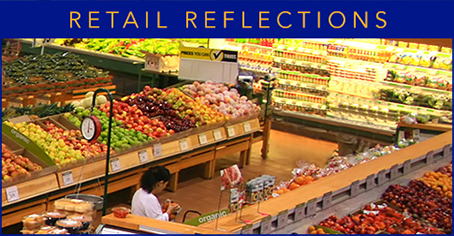When examining the quarterly releases from major retailers, you find a number of explanations for flat to declining sales.
One universal explanation from conventional retailers centers around the proliferation of online shopping—which continues to account for a greater share of total retailer dollars. Numerous online shopping companies are cropping up as well as partnerships between virtual retailers and logistics providers. This continues to put added pressure on conventional brick-and-mortar chains to defend their market share against rising online purchases.
Fresh produce, as well as other perishables, actually provide an opportunity for traditional supermarket chains to remain relevant in the face of today’s internet savvy shopper. This is because shoppers actually ENJOY selecting fresh produce while they DISLIKE shopping for the routine dry grocery and consumables they use on a regular basis. So while consumers like to spend time selecting tomatoes, most would rather not shop for toilet paper.
During the mid-1990s, I had the opportunity to visit an Andersen Consulting “Smart Store” concept in Chicago. While the internet and corresponding technology were still relatively young, the basic idea was that the store of the future would look very different than what the industry was doing at the time.
“Technology” would provide for basic replenishment items, while the sales floor would be for product categories people love to browse through. Think about it this way: a customer would preorder the products and brands used every week (soft drinks, paper towels, ketchup, mustard, bread, milk, or eggs)—and these items would be preassembled in the store’s backroom and ready to go when the consumer arrives and after he/she has browsed through the produce, bakery, deli, specialty cheese, or meat departments.
Rather than have prominent displays of say, yellow mustard, store shelves would be stocked with multiple varieties of spicy or brown mustard and surrounded by extra space for fresh produce and other nonstaple items. All this while enjoying a cup of preordered cappuccino, ready when the customer walks in the door. Who needs groceries delivered to their home when you have this type of environment to shop in!?!
Whole Foods, The Fresh Market, H-E-B’s Central Market, Bristol Farms, and other “fresh stores” are already providing an exciting shopping experience. Peapod, AmazonFresh, and others are proving that consumers will, in fact, order conventional groceries online. Walmart, Kroger, and other brick-and-mortar retailers are providing the ability to order products online and pick them up at a physical location. And Starbucks already lets me mobile preorder my macchiato—so the basics are already in place.
The challenge, thus far, has been the “either/or” mindset. You either shop online or you shop at a physical store. The future of retailing lies in both. Not only is the technology developed enough and ubiquitous in our social fabric, but conventional retailers must find a way to better utilize their physical space. The surge in the 1990s to build large footprint stores has left the industry with significant space that needs to be more productive.
Entire categories of merchandise that used to provide revenue and margin have been lost to online retailers and other formats, yet the fixed expense of this space remains. What better way to leverage this space then to provide a way for routine shopping to be done for the consumer, and the prime retail space be given over to merchandise categories that excite shoppers?
The financial releases of the future will not decry to proliferation of online shopping, but rather credit its strong performance. The pieces of this shopping experience are already in place. I can’t wait to see which retailer finally puts the whole experience together and opens up a new era in the food shopping experience.



